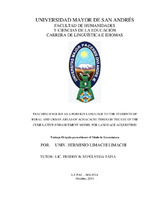| dc.description.abstract | The learning of another important foreign language becomes an important tool for the success of people at different ages who want to go further in education in different fields such as business, tourism, linguistics, education, and others; or simply for exchanging ideas with foreign people. In that sense English has become one of the most vital languages throughout the world, required by many countries as their first or second language; besides, it is one of the most widely spoken and learned language around the world.
According to the new Constitution, Bolivia constitutes a single social unitary State with a plural community; free, independent, sovereign, democratic, intercultural, decentralized and with autonomies. Bolivia is based on the pluralism of politics, economy, judiciary institutions as well as its cultural and language diversity. Although the majority of the population in the country speak Spanish, a former official language of the country, there are around other thirty-six languages recognized by our new political Constitution in different sociolinguistic contexts being the most important Aymara and Quechua.
Because of the great poverty in our country, seems that English is of minor importance. Almost half of the population of Bolivia speak Aymara, Quechua and other languages, and when they come to the cities, learning Spanish is their main concern; therefore, English is of little use of the majority so they do not learn it. According to Bradley1, an English Teacher, even though there is little requirement for English in Bolivia, people do learn, mainly for reasons of self-improvement or prestige. English is studied only at very low levels, or not at all in public schools, so they have to go to independent English schools if they want to. The Army Languages School in our country, an Institute where English is taught and other foreign and Native languages as well, is located in the center of La Paz city, and has its branches in different cities and towns such as Cochabamba, Riveralta, Achacachi, with positive results. It was seen that the classrooms in the Army Languages School in Achacachi were with just a few students; consequently, the intention of this project was to draw students of the area who are Spanish and Aymara speakers towards learners of English. | es_ES |

